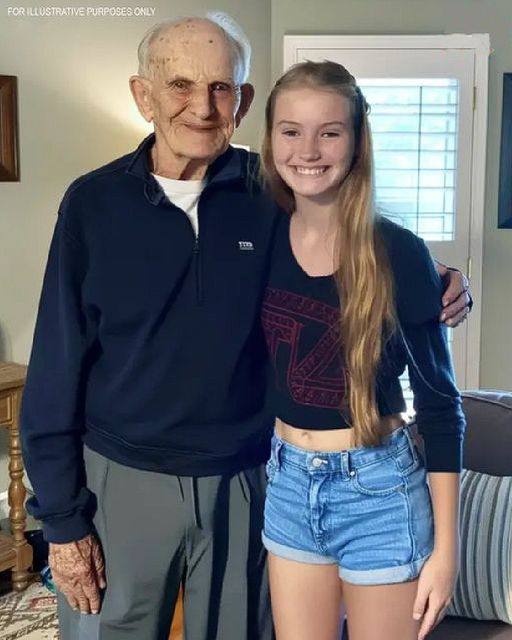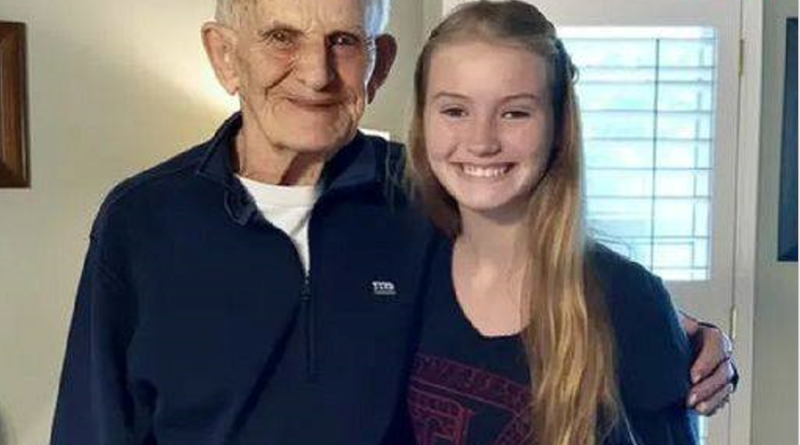At My Grandfather’s Funeral, a Stranger Handed Me a Note – When I Read It, I Laughed Because Grandpa Had Tricked Us
As I stood beside my grandfather’s grave, my fingers dug deep into the pockets of a too-small black dress, desperately seeking warmth. The chilly October breeze carried the voice of the priest, which merged with the rustle of dry leaves. It was the saddest day of my life, and yet, the sorrow I felt seemed to stand alone against a backdrop of something entirely different.
The rest of my family wasn’t mourning Grandpa; they were seething. He had left each of them a measly one-dollar inheritance, and their outrage hung in the air, thick and bitter. It seemed to overshadow even the funeral itself. Uncle Vic and Aunt Nancy, my mother’s siblings, wore tight expressions, a mix of disbelief and anger. My mother stood beside me, her arms crossed firmly across her chest, her lips pressed into a thin line.

“One dollar each,” Aunt Nancy hissed under her breath. “One damn dollar! That man had plenty of money. How could he do this to us?”
Uncle Vic shook his head, letting out a sarcastic laugh. “Spiteful old man. I swear he planned this just to piss us off.”
“Typical Dad,” my mom muttered, her eyes narrowing. She shot me a sideways glance, her suspicion obvious. “Dahlia was always his favorite. I bet she got more than the rest of us.”
I kept my eyes glued to Grandpa’s coffin, feeling the weight of their resentment. They were all so angry, so consumed with what they believed they deserved. It was sad, really. I hadn’t received anything more than they had—only a single dollar bill—but I also wasn’t interested in Grandpa’s money. I wasn’t here for that.
Grandpa had meant everything to me. He was the only one who truly saw me, who didn’t think of me as the mistake or the spare kid that nobody noticed. He had taken me in when no one else in the family seemed to care. He’d always told me stories, shared laughs, and made me feel like I mattered. He made me feel at home, even when my actual home didn’t. I brought him a red rose for his coffin—the only red flower amongst the white daisies that everyone else had laid on his casket. It seemed fitting; he had always stood out, after all.
“What did he leave you, Dahlia?” Aunt Nancy’s voice snapped me out of my thoughts. Her eyes were sharp and accusing, her gaze piercing through me. “Don’t act like you didn’t get something. Spill it.”
“I got the same as all of you,” I replied, my voice steady despite the tension.
My mom’s hand clamped down on my shoulder, her nails digging slightly into my skin. “Are you sure? You spent all that time with him. Think, Dahlia. He must have told you something.”
Memories of Grandpa’s goofy stories rushed back. Stories of long-lost treasures and the butterscotch candies he always kept in his coat pocket. Sometimes he’d wink at me and say, “One day, kiddo, I’m going to leave you a real treasure.” I had always assumed it was just a game—one of his many jokes.
I shook my head slowly, turning back to the coffin. “What Grandpa gave me was his love and his stories. That was more than enough.”
“Nobody cares about that sentimental crap,” my mom snapped, her eyes narrowing. “Think! Where did all his money go?”
I shrugged. The truth was, I didn’t know, and I didn’t care. Grandpa’s money didn’t mean anything to me. All I wanted was for him to be here, to tell me one more story, to make me laugh. But he was gone, and they only seemed to care about slapping a price tag on his absence.
When they realized I had nothing of value for them, they turned their backs, their voices growing louder as they walked away, arguing with each other about lawyers and last wishes. It made me sick—this scramble over something as meaningless as inheritance. I closed my eyes, hoping the wind would blow away the sound of their bitter words.
“You must be Dahlia,” a soft voice spoke beside me.
I opened my eyes to see an elderly woman, maybe in her sixties, standing next to me. She wore a simple coat, and a worn leather bag hung over her shoulder. Her eyes were kind, her expression gentle, as if she understood something no one else did.
“I was a friend of your grandpa’s,” she said, leaning in conspiratorially. “He asked me to give you this.” She slipped a small folded piece of paper into my hand, her fingers briefly brushing mine. “Make sure no one else sees it,” she whispered. “Especially your family.”
Before I could say anything, she disappeared into the crowd of mourners, as if she’d never been there at all. My heart began to pound as I looked down at the paper, my fingers trembling as I slowly unfolded it.
“111 locker — Southern Railway Station.”
The words blurred as I read them, my mind struggling to make sense of it. And then it hit me: Grandpa’s treasure. The one he always promised me. He wasn’t joking after all. A laugh escaped my lips, sudden and almost wild, surprising even me. It was the first bit of real emotion I’d felt all day.
That night, I lay awake in bed, the note hidden beneath my pillow, Grandpa’s voice echoing in my mind: “Locker number 111… There’s treasure in there, kiddo!” I stared up at the ceiling, a weight settling in my chest that felt like a mix of grief and hope. What if this wasn’t some prank? What if Grandpa had really left me something—something that only I was meant to find?
The thought consumed me until I couldn’t take it anymore. I needed to know what was in that locker.
The next morning, as dawn broke, I called a cab. I tiptoed past the kitchen, hearing my mom still muttering about Grandpa’s will, probably trying to squeeze sympathy or favors out of anyone who would listen. I slipped out of the door, the cold morning air hitting my face like a slap, waking me up fully.
The cab ride to Southern Railway Station felt endless. My knee bounced with nervous energy, my mind racing as we passed empty coffee shops and graffiti-covered walls. The driver glanced at me a few times in the rearview mirror, but he didn’t say a word, and I was grateful for the silence.
When we finally arrived, I stepped out and asked him to wait for me. The station smelled like diesel fuel and stale popcorn. People bustled in every direction—commuters, travelers, strangers all with places to go. I stood still for a moment, feeling small and overwhelmed. But then Grandpa’s words echoed again: “Real treasure, kiddo.”
I took a deep breath, walking towards the lockers, my heart pounding louder with each step. The metal lockers stood in rows, gray and dented, each one looking identical to the next. I scanned the numbers until I found it: locker 111.
I reached into my pocket, pulling out the note. Taped to the back of it was a small, rusted key. With trembling fingers, I peeled it off and slid it into the lock. For a moment, it jammed, and my heart leaped into my throat. But then—click. The lock turned, and the door swung open.
Inside was a duffel bag. It looked old and worn, the fabric faded and frayed at the edges. My hands shook as I pulled it out and unzipped it, my breath catching in my throat.
Bundles of cash. Stacks and stacks of crisp hundred-dollar bills filled the bag. My eyes widened, my head spinning. It didn’t seem real. I reached in and picked up one of the bundles, flipping through the bills. There had to be at least $150,000 in there. And nestled between the stacks was a folded note in Grandpa’s familiar, messy handwriting.
“For my beloved granddaughter, everything I saved is now yours. Take it and live free, kiddo. The rest of the family may not see your worth, but I’ve always believed in you.”
Tears welled up in my eyes, and I hugged the note to my chest, my heart swelling with emotion. This wasn’t just money—it was a way out. A chance to escape the bitterness, the anger, the constant feeling of being overlooked and underestimated. Grandpa had always known. He’d seen how badly I needed to get away from it all. And now, he’d given me the means to do just that.
I zipped the bag shut, slung it over my shoulder, and walked out of the station, my heart racing. The early morning sun was just beginning to peek through the clouds, casting a golden glow over everything. For the first time in a long time, I felt light—like the weight of everything was finally lifting.
On the ride back, I stared out of the window, watching the city come to life. I had options now. I didn’t have to stay stuck in that house, listening to their constant arguments and demands. I could leave. I could start fresh, build something new for myself. The thought was both terrifying and exhilarating, but I knew what I had to do.
As the cab pulled up to my house, I made my decision. I wasn’t going back in. Not for another minute. I pulled out my phone and booked the first plane ticket I could find.
“Take me to the airport,” I told the driver, my voice steady and sure. He nodded, and we drove off.
With the duffel bag resting in my lap and Grandpa’s note safe in my pocket, I leaned back in the seat, a smile spreading across my face. I was free. And for the first time in my life, I knew exactly what that meant.
